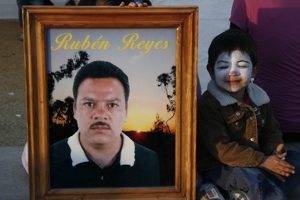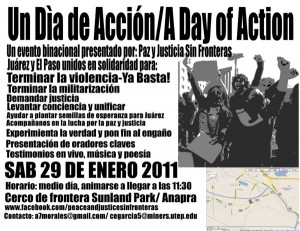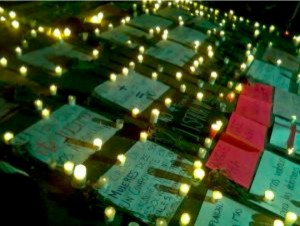This weekend, Global Exchange’s Human Rights Director, Ted Lewis participated in the fast for peace and bi-national rally that took place in Juárez. He shares his experience.
As we pay fifty cents to walk across the bridge from El Paso Texas to Ciudad Juárez on Friday night the sunset is beautiful, but I am nervous and a little scared. We’ve driven 20 hours overnight from San Francisco to participate in a fast for peace and public commemoration of the massacre of 18 high school students planned for the weekend.
We’ve arranged to be met on the other side by Silvia, a former nun who is helping organize the event. Everything is well planned, but as evening falls, I can’t help thinking that we are about to arrive at dusk in what has become the most dangerous city in the world and where the lines between criminal gangs, federal police, army, and local police have become blurred.
I’ve always been struck by the contrasts along the border: the wealth of the United States literally side by side with the unrelenting poverty in Mexico. Tonight I reflect on another contrast – in Juárez three thousand people died in 2010 in violence attributed to a war over drug profits, yet neighboring El Paso where the drugs arrive for shipment to markets around our country, ranks as one of the safest cities in the United Sates.
As we reach the other side a pleasant young soldier gives a cursory look at my backpack, while we scan the crowd for Silvia. There she is, a tiny woman who guides us a few paces to her battered old car and drives us through darkening streets filled with shuttered businesses to a small convent where we spend the night. The only sounds I hear throughout the night are the horns of the trains that ply the tracks along the border, just a few blocks away.
Early the next morning, we gather in the center of the city with a group of Juarenses who have decided to step forth, defy their fear, and overcome the divisions that have kept them silent. The crowd gathers in the center of the city at the base of an elegant marble pillar topped by a statue of Mexican hero, Benito Juárez, the city’s namesake. The crowd slowly grows as a list of the fifty some organizations that have joined together are read by a priest from the Human Rights Center Paso del Norte, the prime organizers.
We settle in, knowing that this is going to be a 28-hour overnight vigil in the cold with no food. Then, the somber crowd is shaken up by a clown who brilliantly mimics our downturned faces and manages to get us all up on our feet participating in his silly antics. He sets the mood for a long day filled with music, face painting for kids, and dancing that keep spirits high despite devastating testimonies from families whose loved ones have been victims of the growing violence that has inundated the city. Many of the people that take the microphone during the day comment that sharing their tears and fears in public space is uplifting and a needed ingredient to build resistance to the terror that has kept them hunkered in their homes.
At noon, we join a caravan of more than a dozen vehicles that heads to the border fence. There, in the presence of a dozen border patrol vehicles, we take place in an extraordinary bi-national demonstration against the violence in Mexico and its roots in the insanity of the never ending U.S. “war on drugs” and permissive gun laws that allow thousands of assault rifles to be legally purchased and then smuggled south across the border. Speakers on platforms set up in the glaring sunlight on both sides of the fence stir the crowd with a mixture of Spanish and English. One of the fasters, Emilio Alvarez, the former human rights ombudsman of Mexico City asks why the U.S. can catch so many migrants heading north, but can’t stop the thousands of guns heading south every year. Reporters mingle with the crowd and the border patrol looks on nervously.
At the conclusion of the rally, we return to the city center and gather anew around the statue of Juárez. We are buoyed by reports from simultaneous fasts happening in Mexico City, Cuernavaca, and nearby in the Salvacrar neighborhood of Juárez where last year’s massacre of the 18 students took place.
As night falls, we light hundreds of candles in paper bags on the steps around the statue. The glowing bags, arranged to spell JUSTICIA, stay lit all night, reminding us why we are there as the temperature drops and we huddle around fires and sing together into the darkest hours of the night.
As day breaks, we are cold tired and hungry, but amongst the Juarenses one senses a spirit of victory. No, we have not changed the insane drug policies that fuel this war, nor have we broken the links between the Mexican state and the vicious criminal cartels, but we have stood up and said NO MAS SANGRE–NO MORE BLOODSHED.
A seed has been planted and at least for a moment people have broken though the fear that has paralyzed them. We depart at noon with hugs, prayers, songs, and silly clowning around and refresh determination to build a powerful movement to put an end to this scourge that has blighted so many lives.
It is clear that this tragic violence is fueled by U.S. military aid to Mexican security forces through the Merida Initiative. Help us grow our petition of calling on the Obama Administration to uphold human rights and halt drug war aid to Mexican security forces.



